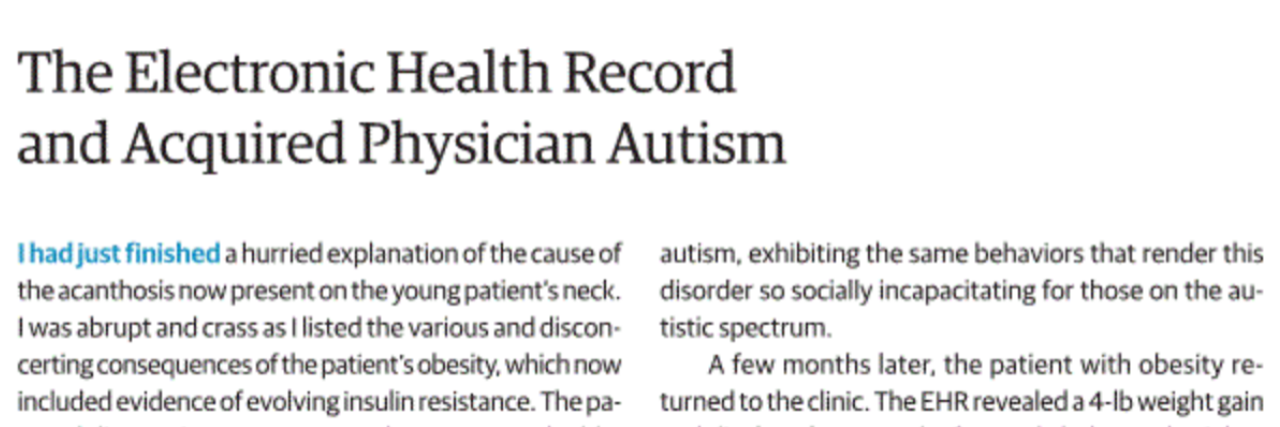JAMA Pediatrics Article Uses 'Acquired Physician Autism' to Describe Doctors Who Lack Compassion
An opinion piece published Monday in JAMA Pediatrics about “acquired physician autism” has infuriated both the autism and medical communities for its insensitive stereotyping of autism.
The article, “The Electronic Health Record and Acquired Physician Autism,” was written by Dr. Peter Loper Jr., who works in the department of neuropsychiatry and behavioral science at Palmetto Health in South Carolina.
The article criticizes the use of electronic health records (EHR) during patient visits. Loper writes that the pressure to maintain EHRs during visits for efficiency doesn’t allow for the physician to connect with the patient or pick up on social cues during the visit. Instead, doctors are more worried about updating the records and hurrying patients along to stay on a 15-minute per patient schedule.
“Our eye contact is intermittent at best, and we have become indifferent to nonverbal signs of patient distress. Some stare at computers or tablets, repetitively typing or clicking,” he writes. “Worse, we have become inept or completely incapable in maintaining the meaningful clinician-patient relationships that were once at the cornerstone of our profession.”
Loper continues, noting that these behaviors “mimic” autism and exhibit the “same behaviors that render this disorder so socially incapacitating for those on the autistic spectrum.” Loper also calls “acquired physician autism” an epidemic.
People in the autism community, as well as medical professionals, expressed their concerns on social media. Many said the autism metaphor is stigmatizing and inaccurate. People on the autism spectrum can have compassion for others, and autism isn’t something you acquire because of a change at work. Other Twitter users said they were surprised the article was published in JAMA Pediatrics, a reputable scientific journal.
@JAMAPediatrics As a PCP who cares for both children & adults of all medical backgrounds (including autism), I am concerned about your recently published piece "The EHR & Acquired Physician Autism". People with autism do not suppress or lack compassion as the author suggests.
— Alex Mieczkowski, MD MS (@aem204) September 25, 2018
Mieczkowski’s thread continued:
I am more concerned that a piece with such a title and insinuations made it through an editorial process. I hope that the editorial board can be introspective and consider how this characterization might feel to a patient with autism.
— Dr. Alex Mieczkowski, MD MS (@aem204) September 25, 2018
The words we use matter. “Physician acquired #autism” should never see the light of day again. Extremely disappointed that @JAMAPediatrics & it’s reviewers found the insensitive parallels appropriate for publication. #PatientAdvocacy
— Enlightening Results (@GraceCordovano) September 24, 2018
Definitely appreciate the points re EHR. However, this idea of "acquired autism" strikes me as stigmatizing of autism. The effect of the title hinges on our biases against autism
— Colleen Farrell, MD (@colleenmfarrell) September 24, 2018
This is rude and unprofessional. Autism is not acquired. It is not a disease. It is not a susbstitute for the word “heartless” or “unfeeling.” The association of lack of compassion with autism is due to the inability to perceive autistics as human. By smug doctors.
— Wrong Fabric (@WrongFabric) September 24, 2018
Interest in Loper’s article increased after Dr. Eric Topol, a well-known physician and author, tweeted the article to his 139,000 followers on Monday. In a now-deleted tweet, Topol said the essay was “shrewd and succint” and that Loper nailed the issue.
Topol apologized for sharing the article after his tweet was retweeted by Steve Silberman, author of “Neuro Tribes,” who added that the article was “careless, unprofessional and exhibits a lack of understanding of the harm these clichés cause autistic people.”
I am deleting this tweet. I read it about its attack on electronic health records, which I fully identify with, and missed how the use of the metaphor conveyed insensitivity. Your point is well taken. Always learning. My apologies.
— Eric Topol (@EricTopol) September 25, 2018
In a statement provided to The Mighty, JAMA said it had bee notified about the backlash toward Loper’s article. “JAMA is aware of the criticism and that the language is painful for families and their children,” JAMA said. “The term was used to express the author’s experience with EHRs and will not be used again as a metaphor.”
The Mighty has reached out to Loper for comment and has yet to hear back.

